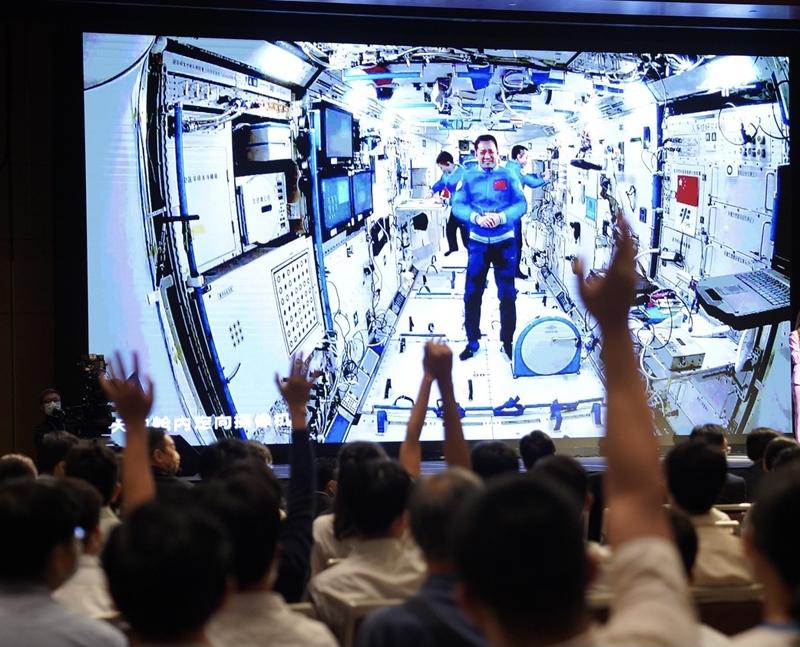 Hong Kong students raise their hands to ask Chinese astronauts on board the Tiangong space station questions during a real-time video dialogue on Sept 3, 2021. (PHOTO / XINHUA)
Hong Kong students raise their hands to ask Chinese astronauts on board the Tiangong space station questions during a real-time video dialogue on Sept 3, 2021. (PHOTO / XINHUA)
In a video call beamed from outer space by Shenzhou-12 taikonauts at Tiangong space station on Friday, Hong Kong students got the chance to ask their burning questions about the lives of the three Chinese astronauts. The video call also featured a Q&A session in which experts, including the first Chinese national to enter space Yang Liwei, fielded questions from the excited pupils.
1: A student from Scientia Secondary School:
Can you exercise in the space station? Would you show us?
Nie Haisheng: Sure. We must exercise to reduce the effects of a weightless environment. The station has a lot of exercise equipment, such as a space bicycle and treadmill. When running on the machine, we need to fix our upper body on it to keep balanced. Riding the bicycle will help us build muscle strength and improve cardiopulmonary function.
In space, we can not only ride bicycle using our legs, but also use our hands by fixing our legs on the ceiling of the station. (Nie demonstrates how to ride the bicycle using the two different positions). We also usually practice Tai Chi to stretch muscles.
ALSO READ: How Chinese astronauts stay healthy in space
2: A student from St Paul's Co-educational College:
Where does water come from in space, and how do astronauts drink it?
Liu Boming: Water is produced in two forms, one by separating air from cold air to extract condensed water, and the other by processing urine to produce distilled water. Both processes need to remove ionic pollutants and organic matter and add some salt before they can be processed into reclaimed water.
Water has three uses for astronauts. The first is to refill the space suits, which have a lot of tubes inside to hold water to cool down the heat. The water can also be used to produce oxygen for astronauts to breathe and to drink.
To drink water in space takes some technique. For someone who is an astronaut and loves Kung Fu tea, water is precious. So I made a bag of tea and now I'll show you how to drink it in space.
I had to gently squeeze the bag in order to make the right size of a floating water ball and then I can slowly drink it when the ball is floating steadily.
READ MORE: Chinese astronauts answer HK students' questions from space
3: A student from the Chinese Foundation Secondary School:
Can satellites be seen outside the space station? Do the stars look the same in space as from the ground?
Liu Boming: We are very lucky to be in a great era in which generations have developed our national aerospace industry to where it is now. We have seen the grandeur of the earth and some magnificent scenes during two extra-vehicular activities. It's like a sci-fi movie unfolding before me. The most unforgettable moment was when we opened the hatch. "Beautiful" is not even close to describe what we saw.
Looking at the horizon, the rainbow was colorful; on the right, the sun had just risen. Without the shelter of the atmosphere, the sunlight was radiant. Looking down, the blue planet was at our feet. We saw the Atlantic and the Mediterranean; we saw the smoke of Afghanistan, the Tianshan Mountains in Xinjiang, the Taklimakan Desert and the Himalayas. We also saw the Victoria Harbour of Hong Kong, as well as the capital Beijing.
Soon night fell, and the sky was full of stars. From the ground, we see stars blinking because of the atmospheric refraction. However, it is different in space.
I hope people from Hong Kong will join our astronaut team. In achieving the Chinese dream and the space dream, there will be you and me.
4: A student from Clementi Secondary School:
Why did you become an astronaut? What do you think is the coolest thing about the job?
Yang Liwei (First Chinese national in space): At first, I wanted to be a pilot. After that dream was realized, I took an interest in aerospace science. Luckily, the nation had launched its manned space projects at that time. I devoted myself to the nation's aerospace development out of my passion and the nation's need, and the country has made improvements in economy, technology and overall strength.
I have come to Hong Kong many times and communicated with many Hong Kong students. From Shenzhou 5 mission to Shenzhou 12 mission, astronauts have shown many work and life-related scenes during each mission. What these astronauts have achieved is all "cool". For me, the coolest moment was when I displayed the national flag and greeted all Chinese people as the first Chinese astronaut entering space.
READ MORE: HK students say video talk with astronauts in space 'incredible'
5: A student from University of Hong Kong:
The microgravity state in space creates a very special environment for doing experiments. Can you tell us about the space experiments conducted in this mission?
Tang Hongbo: We mainly focus on three areas of study - physics in weightlessness, aerospace medicine and human factor engineering. We take advantage of this precious opportunity to study the special physical phenomena in the weightless environment, as well as various physical and mental effects of space flight on astronauts, so as to find a better way for people to work and live in space. These experiments also help us better prepare for finding an "extraterrestrial homeland" for mankind.


